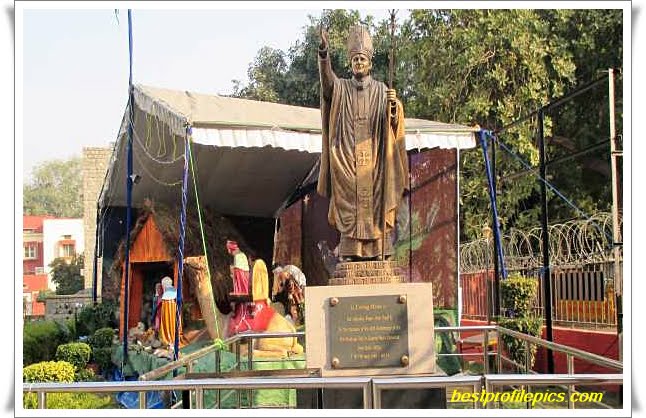Christmas is an annual festival commemorating the birth of Jesus Christ, observed primarily on December 25 as a religious and cultural celebration among billions of people around the world. It is a widely celebrated festival, that holds a special place in the hearts of people worldwide. The traditional Christmas narrative recounted in the New Testament, known as the Nativity of Jesus, says that Jesus was born in Bethlehem, in accordance with Messianic prophecies. This article takes you on a journey through the origins, traditions, and significance of Christmas, shedding light on why it remains a time of joy, unity, and reflection for people of various cultures and backgrounds.
The Origins of Christmas
The Biblical Account
According to the Bible, Jesus was born in Bethlehem, a momentous event that would alter the course of history. The New Testament recounts a miraculous visit from the angel Gabriel to a young woman named Mary in the town of Nazareth. Gabriel’s message was clear: Mary would give birth to a son, and this child would be none other than Jesus, the son of God. The prophecy of the son of God’s birth had been foretold long ago in the Old Testament.
A Humble Birth in a Manger
Joseph, soon to be Mary’s husband, was also visited by the angel Gabriel, who conveyed the divine message to him. However, the unfolding events took an unforeseen turn. A decree was issued by the Roman emperor which necessitated a census of all citizens in their respective towns. As Joseph and Mary reached Bethlehem, they found no room in the inns, and with Mary’s due date imminent, they had to take shelter in a stable as their refuge. In this humble setting, the baby Jesus was born in a manger. It was a momentous occasion, witnessed not only by Mary and Joseph but also by celestial beings.
The Arrival of 3 Wise Men
The biblical narrative introduces us to the Three Wise Men, often referred to as the Magi, who played a pivotal role in the Christmas story. Their journey to meet the infant Jesus is described in the book of Matthew (Matthew 2:1-12, New Revised Standard Version). These wise men hailed from the East, arriving in Jerusalem, inquiring about the child born to be the King of the Jews. Their quest was guided by a star’s appearance, a celestial sign of great significance. Their visit was a momentous event, and the Magi brought precious gifts – gold, frankincense, and myrrh – as tokens of reverence.
The Birth of a Tradition
While the precise date of Jesus’ birth remains uncertain, it was in the early fourth century that Pope Julius I designated December 25 as the day to celebrate Christmas. This choice coincided with the winter solstice and sought to replace the pagan festivals with a Christian holiday. The first recorded Christmas celebration occurred in Rome in the year 336. Since then, December 25 has been universally recognized as the date for Christmas, aligning with the Roman calendar’s solstice. It was this historical decision by Pope Julius I that is why we celebrate Christmas on December 25.
Global Celebrations and Traditions
Christmas is celebrated by most countries worldwide on December 25. However, in some Eastern countries that follow the Julian calendar, Christmas is observed in January. The birth of Jesus is celebrated, beginning on January 6 and extending to January 19, focusing on the Epiphany, the baptism of Jesus. These celebrations encompass a rich tapestry of customs, from attending church services and carol singing to chalking the door, blessing homes, and indulging in Three Kings Cake. Some even engage in winter swimming, where holes are cut in frozen bodies of water, often forming a Christian or Orthodox cross.
Time-Honored Christmas Traditions
Christmas has become a worldwide cultural and commercial phenomenon, celebrated by Christians and non-Christians alike. Some popular Christmas traditions include:
Decorating Christmas trees
The tradition of decorating homes with festive lights, ornaments, and Christmas trees has been cherished for centuries. These decorations symbolize hope, joy, and the spirit of the season. The world’s largest Christmas tree is located in Dortmund, Germany, and is over 280 feet tall.
Exchanging gifts
Exchanging gifts is a hallmark of Christmas, inspired by the story of the Three Wise Men presenting gifts to the baby Jesus. It’s a way to show love and appreciation to family and friends. The world’s largest Christmas present was given to the city of New York by Norway in 1947. It was a 70-foot-tall spruce tree that was decorated with over 7,500 lights.
Waiting for Santa Claus to arrive
Santa Claus is a legendary figure originating in Western Christian culture who is said to bring gifts during the late evening and overnight hours on Christmas Eve. He is said to accomplish this with the aid of Christmas elves, who make the toys in his North Pole workshop, and with the aid of flying reindeer who pull his sleigh through the air. It is also said that the tradition of Santa Claus is based on a real person, Saint Nicholas, who was a 4th-century bishop known for his generosity and kindness.
Singing Christmas Carols
Carol singing is a beloved tradition where people gather to sing songs that celebrate the birth of Jesus and the joy of Christmas. It unites communities and spreads happiness. The popular Christmas song “Jingle Bells” was originally written for Thanksgiving, but it quickly became a popular Christmas carol.
Nativity Scenes
Nativity scenes depict the birth of Jesus in a manger, complete with figurines of Mary, Joseph, shepherds, and the Wise Men. These scenes remind us of the humble beginnings of the Christmas story.
Advent Calendar
Advent calendars are a fun way to count down the days to Christmas. Each day reveals a surprise or a small gift, building anticipation for the big day.
Christmas Feasting
A bountiful feast is an essential part of Christmas celebrations. Traditional dishes vary by region, but they all reflect the abundance and joy of the season.
Significance and Spirit of Christmas
Celebration of Love and Unity
Christmas emphasizes love, unity, and goodwill. It’s a time to strengthen bonds with family and friends, share kindness, and extend a helping hand to those in need.
Reflection and Gratitude
The festival encourages self-reflection and gratitude for the blessings in our lives. It’s a reminder to appreciate the love and joy that surround us.
Renewed Faith
For many, Christmas offers an opportunity to renew their faith and find solace in the story of Jesus’s birth. It’s a time for spiritual growth and renewal.
Cultural Diversity
While Christmas is rooted in Christianity, it is celebrated by people of various cultures and faiths. It has become a multicultural festival that transcends boundaries.
Global Diversity in Celebrations
Christmas traditions exhibit splendid diversity across the globe. Yet, the core essence remains one of celebration and joy. Homes, offices, and shopping malls sparkle with decorations, bright lights, and glistening Christmas trees. People exchange warm greetings and gifts with family, friends, and associates. The spirit of Christmas is further captured in church services, melodious carols, feasts, and the ceremonial cutting of a special Christmas cake. Children’s faces light up with anticipation, awaiting the arrival of Father Christmas or Santa Claus, the harbinger of gifts.
Christmas and Commerce
Beyond its spiritual significance, Christmas has become a commercial juggernaut. The holiday season ushers in a surge of economic activity, with people embarking on shopping sprees. This festive season is warmly welcomed by shopkeepers and businesses alike, as Christmas and other festivities have now transformed into big business ventures. Christmas, in essence, has woven itself into the fabric of our modern world, encompassing both spiritual reflection and commercial fervor. As we embrace and celebrate this enchanting season, let us remember the profound origins and cherished traditions that make Christmas a time of reflection, celebration, and joy for people from all walks of life.
Embracing the Magic of Christmas in 2023
Christmas, with its deep-rooted origins, cherished traditions, and profound significance, continues to be a festival that unites people and spreads joy worldwide. It’s a time to celebrate love, reflect on blessings, and renew faith. Whether through decorating trees, singing carols, or sharing gifts, the spirit of Christmas touches the hearts of millions, making it a season of goodwill and unity.
As we immerse ourselves in the enthralling tapestry of Christmas, let us carry forward the enduring messages of love, hope, and unity that this season embodies. Regardless of our backgrounds, beliefs, or traditions, Christmas offers an opportunity to extend a hand of kindness, connect with loved ones, and make a positive impact on the world around us. May the spirit of Christmas warm our hearts and homes, filling them with laughter, togetherness, and gratitude. Let this be a season not only of festivities but also of reflection, a time to cherish the past and embrace the future with hope.
In the coming year, may we remember the lessons of Christmas – to give without expecting, to love without conditions, and to share the light of compassion. As we bid farewell to 2023 and welcome a new year, let us make a promise to keep the spirit of Christmas alive throughout the year, spreading joy, kindness, and goodwill to all.
Wishing you a Christmas filled with love, and a joyful, prosperous New Year in 2023 !
Origin of Christmas Tree
1. A Christmas tree is a decorated tree, typically an evergreen conifer, pine or fir tree, or even a fake tree which may look like a Christmas tree, used during the festival of Christmas. Regardless of whether you observe Christmas as a Christian or non-Christian the Christmas tree is broadly acknowledged image of the Christmas season. Families come


Carol Singing
1. Christmas Carol singing is songs or hymns which are sung on the theme of Christmas. Christmas carols can also be termed as Christmas Music. It celebrates the birth of Jesus Christ. When we think of traditional Christmas Carols, the songs “Hark the Herald Angels Sing”, “Joy to the World”, “Silent Night” and other such
Christmas in India
1. Christmas, commemorating the birth of Jesus Christ is celebrated the world over on 25th December. It is one of the most popular festivals celebrated by billions of people around the world. Christmas Day which falls on 25th December is a public holiday in many countries of the world including India. This festival is popular among non-Christians as well and is eagerly











